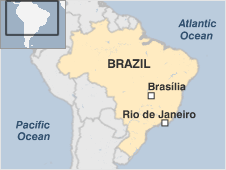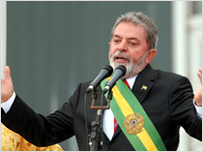Generic Medicines
Taj Pharma is the largest generic pharmaceutical company in India. We hold top positions in different established markets worldwide generics markets..

Brazilian generics are normally known as `similars` and have been the mainstay of the Brazilian manufacturers. Every international patent is understood to have several local copies which outsell the original. Brazil, however, does not manufacture bulk drugs. Similars, which have been subject to lenient regulatory regime, are coming under increasing scrutiny and the National Agency for Health Supervision of Brazil, ANVISA, is expected to introduce obligatory bio- equivalence tests, pharmaceutical equivalence, certificate of origin for the ingredients and GMP certification for such products. Non-prescription medicines account for approximately 30 per cent of industry sales in Brazil.
Brazil is South America's most influential country an economic giant and one of the world's biggest democracies.
 |
But like some of its South American neighbours it has a history of economic boom and bust and its development has been hampered by high inflation and foreign debt.
The exploitation of the Amazon rainforest much of which is in Brazil has become a major worry.
A drive to move settlers to the Amazon region during military rule in the 1970s caused considerable damage to vast areas of rainforest.
Deforestation by loggers and cattle ranchers remains controversial but government-sponsored migration programmes have been halted.
AT-A-GLANCE
 Politics: Lula Brazil's left-leaning president is popular among the poor but his party has been beset by corruption claims; he won a second term in 2006
Economy: Brazil has Latin America's largest economy; there has been steady growth under Lula but millions live in poverty
International: Brazil wants a permanent seat at the UN Security Council; relations with Bolivia suffered in 2006 over access to Bolivian gas
|
In 2005 the government reported that one fifth of the Amazon forests had been cleared by deforestation.
Since then it has made efforts to control illegal logging and introduce better certification of land ownership but environmental reports suggest the reforms have made little difference.
Brazil's natural resources particularly iron ore are highly prized by major manufacturing nations including China. Thanks to the development of offshore fields the nation has become self-sufficient in oil ending decades of dependence on foreign producers.
Brazil has had to be bailed out in times of economic crisis but reforms in the 1990s including privatisations brought some financial stability.
There is a wide gap between rich and poor.
Much of the arable land is controlled by a handful of wealthy families a situation which the Movement of Landless Rural Workers (MST) seeks to redress by demanding land redistribution. It uses direct protest action and land occupation in its quest.
Social conditions can be harsh in the big cities of Rio de Janeiro and Sao Paulo where a third of the population lives in favelas or slums.
Brazil's Aids programme has become a model for other developing countries. It has stabilised the rate of HIV infection and the number of Aids-related deaths has fallen. Brazil has bypassed the major drugs firms to produce cheaper generic Aids medicines.
Brazil is revered for its football prowess. Its cultural contributions include the music of classical composer Heitor Villa-Lobos and Bossa Nova icon Antonio Carlos Jobim.
President: Luiz Inacio Lula da Silva
Luiz Inacio Lula da Silva popularly known as Lula secured a second term in a landslide election victory in October 2006.
He promised to boost economic growth and to narrow the gap between rich and poor. In January 2007 Lula marked the start of his second term in office by announcing an ambitious investment programme.
 Lula promises to help Brazil's poorest while pursuing growth
|
But with a weakened presence in congress his left-wing Workers' Party may have to rely on political alliances to pursue planned tax social security and political reforms.
Lula implemented tough fiscal policies in his first term overseeing economic stabilisation and falling levels of inflation and foreign debt.
He changed the pension system and pushed through a modest increase in the minumum wage. Welfare programmes targeted millions of poor families. But he had to contend with a surge of land invasions by activists frustrated at what they saw as the slow pace of agrarian reform.
In 2005 his popularity was dented by claims of corruption in the ruling party focusing on a cash-for-votes scheme in Congress. The president apologised and said he had known nothing about the alleged corruption.
Brazil is a major commodities exporter and Lula has argued strongly that countries should not put up protectionist barriers in response to the current global economic crisis.
Lula was born in 1945 in the impoverished north-east. His family moved to Sao Paulo when he was seven and he left school at 14 to become a metal worker.
In the 1970s he honed his political skills as a fiery union leader in the industrial suburbs of Sao Paulo. He went on to help found the Workers' Party.
South America's biggest media market is home to thousands of radio stations and hundreds of TV channels.
Media ownership is highly concentrated. Home-grown conglomerates such as Globo Brazil's most-successful broadcaster dominate the market and run TV and radio networks newspapers and pay-TV operations.
Brazilian-made dramas and soaps are aired around the world. Game shows and reality TV attract huge audiences.
The constitution guarantees a free press; vigorous media debate about controversial political and social matters is commonplace.
Brazil is rolling out digital TV services; it aims to switch off analogue TV transmissions from 2016.
The press
Television
Radio
News agencies
Agencia Globo - private

AFRICA | ASIA-PACIFIC | AMERICAS | EUROPE | MIDDLEEAST | SOUTHASIA
![]()
![]()
![]()
Mauritania Mauritius Morocco Mozambique Namibia Niger Nigeria Republic-of-congo Rwanda Sao-tome-and-principe Senegal Seychelles Sierra-leone Somalia South-africa Sudan Swaziland Tanzania The-gambia Togo Tunisia Uganda Australia Brunei Burma Cambodia China East-timor Fiji Indonesia Japan Kazakhstan Kiribati Kyrgyzstan Laos Malaysia Marshall-islands Micronesia Mongolia Nauru New-zealand North-korea Palau Papua-new-guinea Samoa Singapore Solomon-islands South-korea Taiwan Tajikistan Thailand The-philippines Tonga Turkmenistan Tuvalu Uzbekistan Vanuatu Vietnam Antigua-and-barbuda Belize Bolivia Brazil Canada Chile Colombia Costa-rica Cuba Dominica Dominican-republic Ecuador El-salvador Grenada Guatemala Guyana Haiti Honduras Jamaica Mexico Nicaragua St-kitts-and-nevis St-lucia Suriname Trinidad-and-tobago Uruguay Venezuela Albania Andorra Armenia Austria Azerbaijan Belarus Belgium Bosnia-hercegovina Bulgaria Croatia Cyprus Czech-republic Denmark Estonia Finland France Georgia Germany Greece Hungary Iceland Ireland Italy Latvia Liechtenstein Lithuania Luxembourg Macedonia Malta Moldova Monaco Montenegro Norway Poland Portugal Russia San-marino Serbia Slovakia Slovenia Spain Sweden Algeria Egypt Iran Iraq Israel-and-palestinian-territories Jordan Kuwait Lebanon Libya Mauritania Oman Saudi-arabia Sudan Syria Tunisia United-arab-emirates Yemen Afghanistan Bangladesh Bhutan India Nepal Pakistan Sri-Lanka The-Maldive